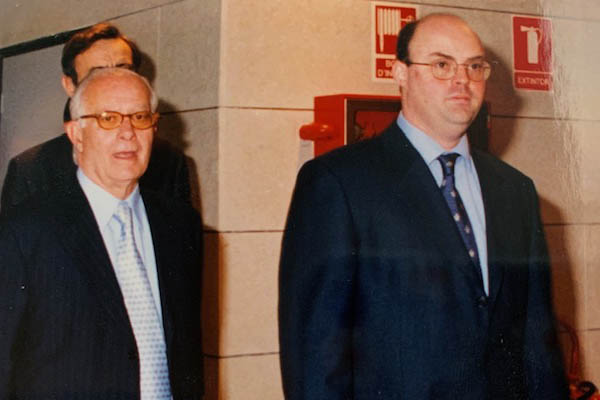Joaquín Farnós, a person to whom the healthcare and politics of the Valencian Community and Spain owe a lot, has passed away. He was always a pioneer and, in my opinion, someone very ahead of his time. This is because he didn’t hesitate to defend projects, initiatives and management models in order to guarantee quality in public healthcare and the sustainability of the system with a long-term view. Farnós represented a liberal, reformist and forward-thinking figure, who set a precedent and whose proposals have been inherited and kept by the parties that have had responsibilities within the Valencian Government since his time as Minister.
Farnós liked to innovate in the 70s, which were difficult years. He was a pioneer in the implementation of thermalism for rehabilitation and rheumatic diseases in the Valencian Community. And not only in a medical capacity but also on a political level. With a liberal, reformist and centrist spirit, as a peacekeeper and integrator, he contributed to the consolidation of democracy in Spain, from the foundation of the Union of the Democratic Center in Castellón to participating in the drafting of the Constitution in 1978.
Joaquín Farnós loved his home, Castellón, but from there he was always committed to territorial balance. And during his time as the Valencian Government’s Health Minister he launched some incredibly pioneering initiatives. I would like to highlight three of them:
The first one is the emergency plan, which we now know as agreements to combat waiting lists. Although they already existed previously, with the Socialist party governments, the big achievement was to systematize them so that anyone on a waiting list for more than 90 days in the Valencian Community could choose between being operated on in their hospital or in a private clinic. This initiative was the first to break the dichotomy between public and private, with the health system as a whole serving the citizens. That measure, which at that time was highly criticized by those who like to repeat the “privatization of healthcare” mantra in almost any forum, was so successful that it has not only been maintained for 25 years, but has also spread to the rest of Spain and is implemented by governments regardless of the political party.
The second revolutionary initiative that Joaquín Farnós launched was the creation of addendum C, which brought an end to the exclusivity of doctors in the public system. Before this addendum, doctors that earned their place in the public system could not work in the private sector. Farnós, with his humanistic, open and inclusive vision, saw immediately that it was not necessary to impose how to work onto medical professionals, but rather that it was more appropriate to enable professionals and give them the freedom to choose whether they wanted to dedicate themselves exclusively to public healthcare or if they preferred to complement that with a period of time in private healthcare.
And last but not least, Doctor Farnós is and always will be the father of the well-known Alzira model, set in motion at Hospital de la Ribera. As a doctor and as a person who knew both the public and private system very well, he firmly believed that it was necessary to maintain values, quality and universality in the public system, but that it was also necessary to allow the private sector to take part in the management of those public resources, maintaining values but innovating prevention policies and providing flexibility in human resources or purchases, amongst other things. The important thing in the long term is to pool resources, opening and improving a system that is too bureaucratized and restricted. In order to achieve that, incorporating the private initiative, of civil society at the end of the day, is key.
Due to that Farnos was able to make the region’s dream a reality in just a year and a half and put an end to the promise that had been unfulfilled since 1982, after the extreme flooding in Tous, by constructing a hospital in Alzira to provide a service to the whole region of La Ribera. He will always be remembered for that.
I had the incredible fortune of knowing and working with Doctor Farnós for a while. One of the memories that I have clearly ingrained in my mind is that he was the first person that I heard say that he was the Minister of public and private. Joaquín Farnós always sought to unite, promote consensus, demonstrate the centrist and conciliatory spirit of the UCD and, with that, managed to unite right and left. He exuded the spirit of the April report, with a vision of the future of the public system above and beyond any ideology, because he was committed to the sustainability of the system, with his view always based on universality, excellence and innovation.
Doctor Farnós always clearly saw that there there are two types of people in life. There are those who propose, construct, create and work positively, always thinking about better services and a greater well-being for citizens; and those that live to destroy the present and even make an effort to change the narrative of the past, because, obviously, facts cannot be changed.
Today I want to advocate for the “ Farnós spirit” in this blog, to make him an example of an unbiased, modest and peacekeeping visionary. Thank you for everything, Joaquín.

